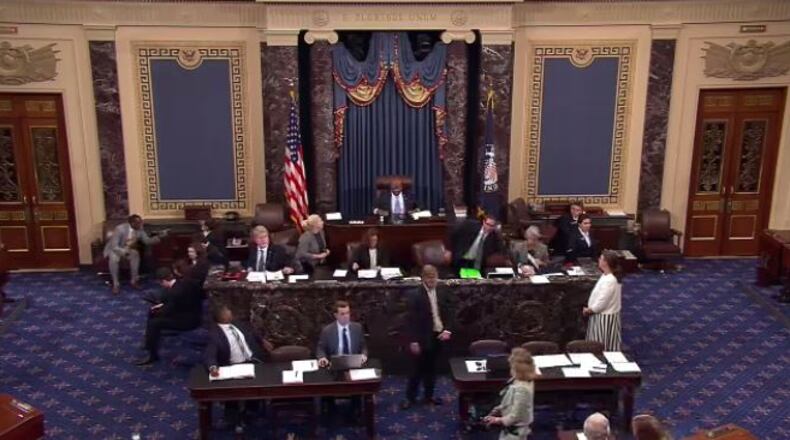Under growing pressure from the House to change how lawmakers deal with workplace harassment claims and damage awards, the Senate on Thursday approved a package of reforms that would not allow members to use taxpayer funds to pay any legal settlements, and change the process for Congressional employees to bring complaints against lawmakers.
"This is an incredibly important moment," said Sen. Amy Klobuchar (D-MN), who joined with Senators in both parties to forge a compromise that was approved on a voice vote.
"We are completely overhauling the sexual harassment policies of the Congress," Klobuchar said on the Senate floor.
"These reforms are commonsense," said Sen. Kirsten Gillibrand (D-NY), who had been more and more vocal in recent days about the lack of action on a similar measure passed by the House.
Along with streamlining the process for employees to bring a complaint - and then have it evaluated by Congressional officials - the plan would force members to personally pay for any legal settlement, and not have taxpayers foot the bill.
"Hardworking taxpayers should not foot the bill for a Member’s misconduct, and victims should not have to navigate a system that stands in the way of accountability," said Sen. Roy Blunt (R-MO).
The extra protections for employees would also be extended to unpaid staffers on Capitol Hill, including interns, legislative fellows, and detailees from other executive branch offices.
Credit: Jamie Dupree
Credit: Jamie Dupree
As the Senate approved the plan, the leaders of the House Ethics Committee confirmed that ex-Rep. Patrick Meehan (R-PA) had reimbursed taxpayers for a $39,000 settlement involving a former female staffer in his office.
"We understand he sent that reimbursement payment to the Treasury. We welcome that action," said ethics chair Rep. Susan Brooks (R-IN), and the top Democrat on the panel, Rep. Ted Deutch (D-FL), in a joint statement.
"There is overwhelming bipartisan consensus in the House that Members should be personally accountable for settlements paid with public funds to resolve claims against them alleging sexual harassment," Brooks and Deutch wrote in a statement.
But what about when lawmakers leave the Congress? The ethics leaders said even then - they should still have to pay up.
Brooks and Deutch also noted that ex-Rep. Blake Farenthold (R-TX) - who had resigned without following through on a promise to pay off an $84,000 settlement - was a perfect example of why the system needs to be changed.
"Farenthold publicly promised to reimburse the U.S. Treasury for $84,000 in funds paid to settle the lawsuit brought against him for claims of sexual harassment, gender discrimination and retaliation," they wrote.
"Last week, he announced that he would not do so," the two added.
The House and Senate must still hammer out a compromise measure between the bills passed by each chamber - but the Senate vote gives a new shot of energy to the effort, though there are House members who feel the Senate plan is not strong enough, especially in dealing with lawmakers.
"I'm optimistic that we can finish the job and get this bill signed into law," Gillibrand added.
About the Author
The Latest
Featured




